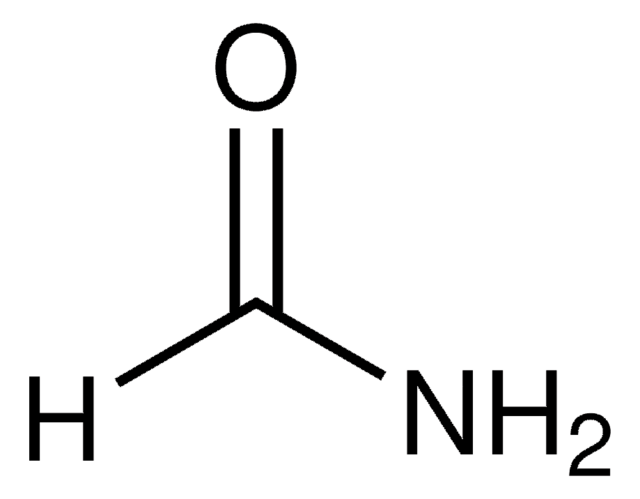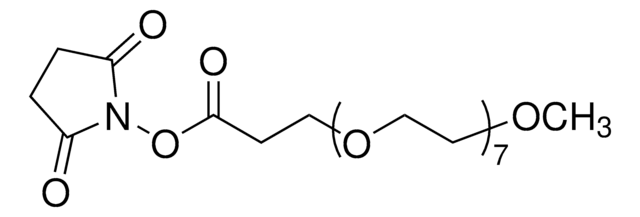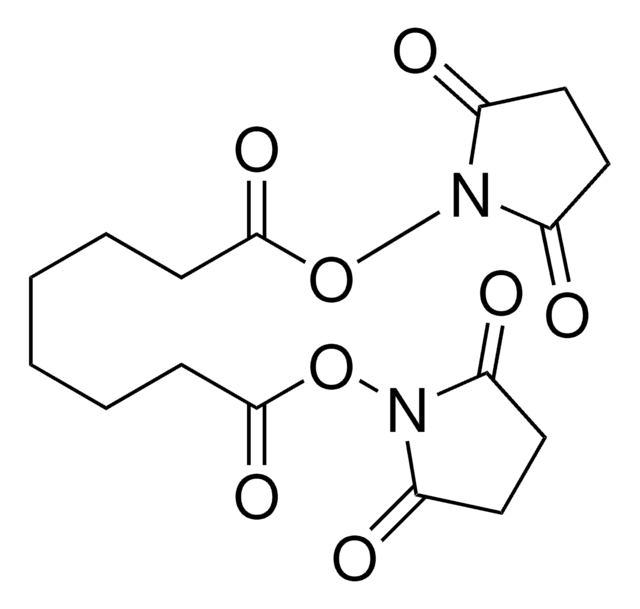803464
BS(PEG)9
Synonym(s):
1,31-Bis(2,5-dioxo-1-pyrrolidinyl) 4,7,10,13,16,19,22,25,28-nonaoxahentriacontanedioate
About This Item
Recommended Products
form
oil
Quality Level
mol wt
708.71
reaction suitability
reagent type: cross-linking reagent
storage condition
desiccated
solubility
water: soluble
shipped in
ambient
storage temp.
−20°C
SMILES string
N2(C(=O)CCC2=O)OC(=O)CCOCCOCCOCCOCCOCCOCCOCCOCCOCCC(=O)ON1C(=O)CCC1=O
InChI
1S/C30H48N2O17/c33-25-1-2-26(34)31(25)48-29(37)5-7-39-9-11-41-13-15-43-17-19-45-21-23-47-24-22-46-20-18-44-16-14-42-12-10-40-8-6-30(38)49-32-27(35)3-4-28(32)36/h1-24H2
InChI key
CQWLSZJYTZVHMU-UHFFFAOYSA-N
Related Categories
General description
Application
- To study the domain structure of BfmR, a regulator of biofilm formation in Acinetobacter baumannii.
- In the study of the mechanism of visual excitation.
Features and Benefits
- Reactive groups: sulfo-NHS ester (both ends)
- Reactive towards: amino groups (primary amines)
- NHS esters react with—NH2 groups at pH 7-9, forming stable amide bonds
- Water-soluble; compare to non-pegylated BS3 (also soluble) and DSS (water-insoluble)
- Membrane-impermeable, allowing for cell surface labeling
- Irreversibly crosslink proteins or peptides by flexible PEG spacer arms
- Polyethylene glycol spacer arms help maintain conjugate solubility
- Pure compound with defined structure and molecular weight, ensuring reproducible protein-modification effects
- PEG spacer provides unique advantages, including increased stability, reduced tendency toward aggregation and reduced immunogenicity
- Ideal for small molecule or peptide conjugations
Caution
Storage Class Code
10 - Combustible liquids
WGK
WGK 3
Flash Point(F)
Not applicable
Flash Point(C)
Not applicable
Choose from one of the most recent versions:
Certificates of Analysis (COA)
Don't see the Right Version?
If you require a particular version, you can look up a specific certificate by the Lot or Batch number.
Already Own This Product?
Find documentation for the products that you have recently purchased in the Document Library.
Customers Also Viewed
Our team of scientists has experience in all areas of research including Life Science, Material Science, Chemical Synthesis, Chromatography, Analytical and many others.
Contact Technical Service










![O,O′-Bis[2-(N-Succinimidyl-succinylamino)ethyl]polyethylene glycol 10,000](/deepweb/assets/sigmaaldrich/product/structures/161/408/20f7ade0-3e2e-4861-ae89-3d81c050059a/640/20f7ade0-3e2e-4861-ae89-3d81c050059a.png)



![O-[N-(3-Maleimidopropionyl)aminoethyl]-O′-[3-(N-succinimidyloxy)-3-oxopropyl]heptacosaethylene glycol ≥90% (oligomer purity)](/deepweb/assets/sigmaaldrich/product/structures/367/864/1c31a65f-501f-4464-8bb3-edff0d131a12/640/1c31a65f-501f-4464-8bb3-edff0d131a12.png)